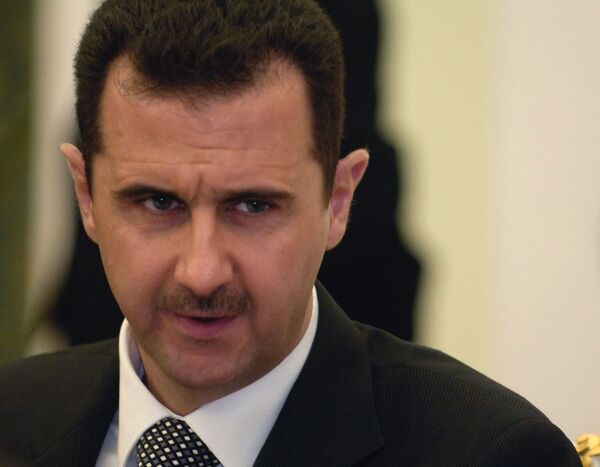WASHINGTON, September 17 (By Carl Schreck for RIA Novosti) – The United States and Russia remained at loggerheads Tuesday over the potential use of force against Syria should Damascus fail to abide by a US-Russian plan to secure chemical weapons stockpiles controlled by the government of Syrian President Bashar Assad.
Washington is pushing for a UN Security Council resolution that would allow the use of military force against Syria in response to noncompliance, US State Department Spokeswoman Jen Psaki said Tuesday, hours after Russian Foreign Minister Sergei Lavrov said that option is a nonstarter.
“We want the strongest possible obligations and enforcement mechanisms,” Psaki told a news briefing, adding that the United States is “working toward” a resolution based on Chapter 7 of the UN Charter, which allows the use of force to ensure peace.
Lavrov told a news conference with French Foreign Minister Laurent Fabius in Paris earlier Tuesday that the resolution would not be based on the Chapter 7 statute, which authorizes but does not mandate military force to “restore international peace and security.”
The impasse comes just days after Lavrov and US Secretary of State John Kerry signed off on a joint plan to place Syria’s chemical stockpiles under international control for eventual destruction, underscoring the potentially tense Security Council negotiations over the text of a resolution as its members prepared to meet at the United Nations on Tuesday.
Psaki said the five permanent members of the Security Council – where Russia holds veto power – would discuss a draft resolution prepared by the United States and fellow members France and Britain at the meeting.
Erin Pelton, a spokeswoman for the US mission to the UN, told Reuters in an email that in order “to respect the integrity of these negotiations, we will not be reading out the details of today’s meeting or the draft resolution.”
The administration of US President Barack Obama has maintained that its threat of military force in response to an Aug. 21 chemical weapons attack outside Damascus, which Washington claims was carried out by Assad’s government, was the key impetus in convincing Syria to agree to handover its chemical stockpile.
Publicly the Obama administration is taking the same tack with regard to Assad’s compliance with the proposed chemical weapons handover.
“If Assad fails to comply with the terms of this framework, make no mistake, we are all agreed – and that includes Russia – that there will be consequences,” Kerry said Monday in Paris after meeting with Fabius and British Foreign Secretary William Hague. “Should diplomacy fail, the military option is still on the table.”
Psaki said Tuesday that Obama, who has faced tepid support at home for US intervention in Syria, “reserves the right to take military action” regardless of what the Security Council decides.
Russia, a longtime ally of the Assad government, has repeatedly rejected outside military intervention in the Syrian civil war and criticized Washington for providing military aid to Syrian rebels Moscow says are teeming with Islamic extremists.
Lavrov said Tuesday that while Russia will not support a Chapter 7 resolution, should reports emerge that Syria is not adhering to its commitments, the Security Council will “examine such a situation to most urgently establish the truth.”
He also repeated Moscow’s position that it is not convinced that the Assad government was responsible for the attack and that it could have been carried out by the Syrian opposition.
Washington and its allies call the suggestion implausible given a report by UN inspectors presented Monday stating that there is “clear and convincing evidence” that chemical weapons were used in the Aug. 21 attack. The report did not assign blame, but Western governments say the evidence clearly bolsters their claim of Assad’s culpability.
Lavrov is “swimming against the tide of international public opinion, but more importantly, the facts,” Psaki said.
If Russia refuses to sign off on a Chapter 7 resolution authorizing the use of force, another option would be a resolution based on Chapter 6 of the UN Charter, which calls for the peaceful settlement of disputes through negotiations, said Mark Drumbl, director of the Transnational Law Institute at Washington and Lee University in Virginia.
“But I think, politically speaking, in light of all the ramping up of rhetoric on chemical weapons and the ongoing nature of violence in Syria, it’s going to be difficult for France and the US to simply satisfy themselves with not condemning this other than through … Chapter 7,” Drumbl told RIA Novosti.



